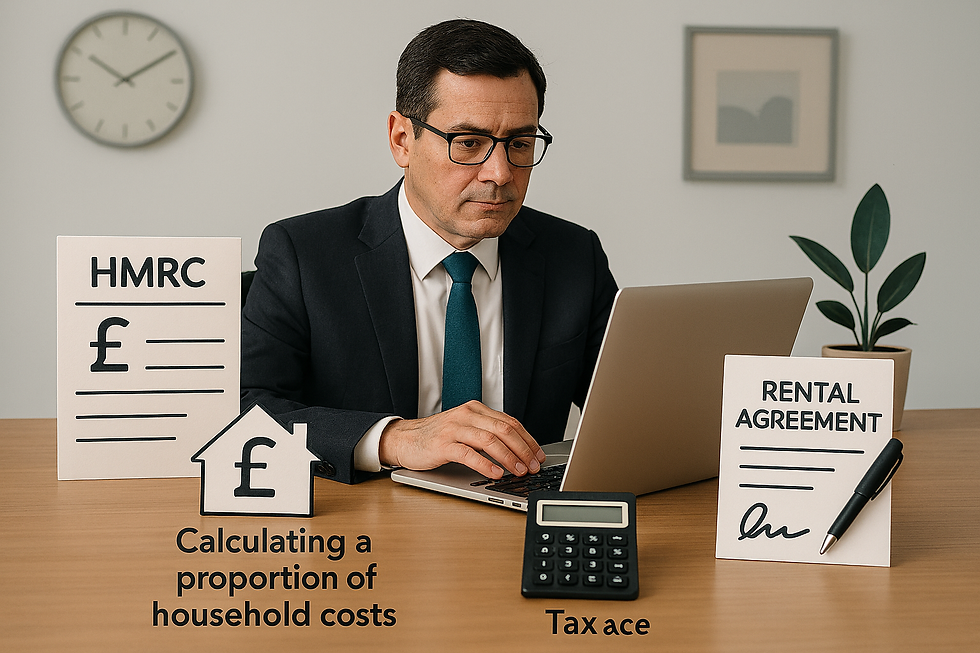Are You Prepared? Essential HMRC Deadlines for UK Business Owners and what to do.
- nk2095
- Sep 23, 2024
- 4 min read
Updated: May 19, 2025
For business owners in the UK, staying on top of financial deadlines is essential to avoid penalties and keep your accounting in good shape. HM Revenue & Customs (HMRC) has a variety of deadlines for different types of businesses, from VAT returns to Corporation Tax payments. Missing any of these deadlines can lead to fines, interest on unpaid tax, and added stress, so it’s important to be aware of key dates.

In this blog, we’ll take you through the most important HMRC deadlines that UK business owners should be aware of and how you can prepare to meet them.
1. Self-Assessment Tax Return Deadlines
If you're a sole trader, in a partnership, or have other income not taxed at source (like from property or investments), you’ll need to submit a self-assessment tax return. The deadlines are as follows:
31st January: Deadline for online self-assessment submission and paying any tax due for the previous tax year.
31st October: Deadline for submitting paper returns (if you're filing by post).
31st July: The second payment on account deadline for those who make advance payments toward their tax bill.
How to Prepare: Ensure you have all relevant income and expense documentation ready well in advance of the deadline. Many business owners choose to hire an accountant to manage their self-assessment submission and to help with tax planning.
2. VAT Return Deadlines
If your business is VAT-registered, in most circumstances, you’ll need to submit a VAT return every quarter. The deadlines are typically:
7th of the month following the end of your VAT period: This is the date by which your VAT return must be submitted and any VAT owed must be paid. For example, if your VAT quarter ends on 31st March, your return and payment are due by 7th May.
How to Prepare: Make sure your accounting software is set up to calculate VAT accurately. As part of the UK’s Making Tax Digital (MTD) initiative, all VAT-registered businesses must use digital software to file their VAT returns. Double-check your figures before submitting and leave yourself enough time to resolve any discrepancies.
Setting up a Direct Debit with HMRC to pay your VAT is a handy way of never missing a payment.
3. Corporation Tax Deadlines
Corporation Tax must be paid by limited companies on their profits. The key dates for Corporation Tax for small businesses are:
9 months and 1 day after the end of your company’s financial year: This is the deadline for paying your Corporation Tax.
12 months after the end of your accounting period: This is the deadline for submitting your Corporation Tax return.
For example, if your company’s financial year ends on 31st December, you need to pay Corporation Tax by 1st October of the following year.
How to Prepare: Keep detailed records of your income, expenses, and profits throughout the year. Work closely with your accountant to calculate your tax liability, allowing ample time to make payments and avoid penalties for late submission.
Click here to book a call with our tax accountants in London and get a handle on your deadlines
4. PAYE and National Insurance Deadlines
If you employ staff, you’ll need to manage Pay As You Earn (PAYE) and National Insurance Contributions (NICs) on their behalf. Key dates for submitting PAYE are:
Monthly: You must report employees’ pay, tax, and NICs to HMRC on or before their payday.
22nd of each month: This is the deadline for paying HMRC the tax and NICs you owe for the previous tax month if paying electronically (19th if paying by post).
How to Prepare: Ensure you use up-to-date payroll software that complies with HMRC requirements. Many businesses outsource payroll to ensure accuracy and timeliness. Always double-check that you’ve filed the correct amounts for each employee to avoid penalties.
5. Annual Accounts Filing Deadlines
All limited companies in the UK are required to file annual accounts with Companies House. The deadlines are:
9 months after your company’s financial year ends: This is the date by which your accounts must be filed with Companies House.
Failure to submit on time can result in penalties ranging from £150 to £1,500 depending on how late the filing is.
How to Prepare: Make sure that your accounting records are kept up to date throughout the year. Accountants typically prepare annual accounts, but it’s important to keep your records organised so that there are no delays in submission.
6. Annual Confirmation Statement
Every company registered with Companies House must submit a confirmation statement at least once a year. This document verifies that all company information is up to date. The deadline is:
A year after your last confirmation statement or company formation: You have 14 days to file it once the due date passes.
How to Prepare: Ensure your company details are correct, including shareholder information, registered address, and director appointments. You can file your confirmation statement online for ease.
When to chat to an accountant
The best time to speak with an accountant is as early as possible. A good accountant will take care of your tax-related responsibilities that are time-consuming and complex. The quicker you start that conversation the quicker you'll start saving time and reduce stress!
About Kala Atkinson
We specialise in taking the burden of accounting deadlines off your shoulders, ensuring that you never miss an important HMRC date. From VAT returns to Corporation Tax and PAYE submissions, we’ll keep track of all the critical deadlines for you, sending timely reminders and managing submissions so that you can focus on what really matters—running and growing your business.
Start a conversation today with our business tax advisors in London - book a call with our experts








Comments